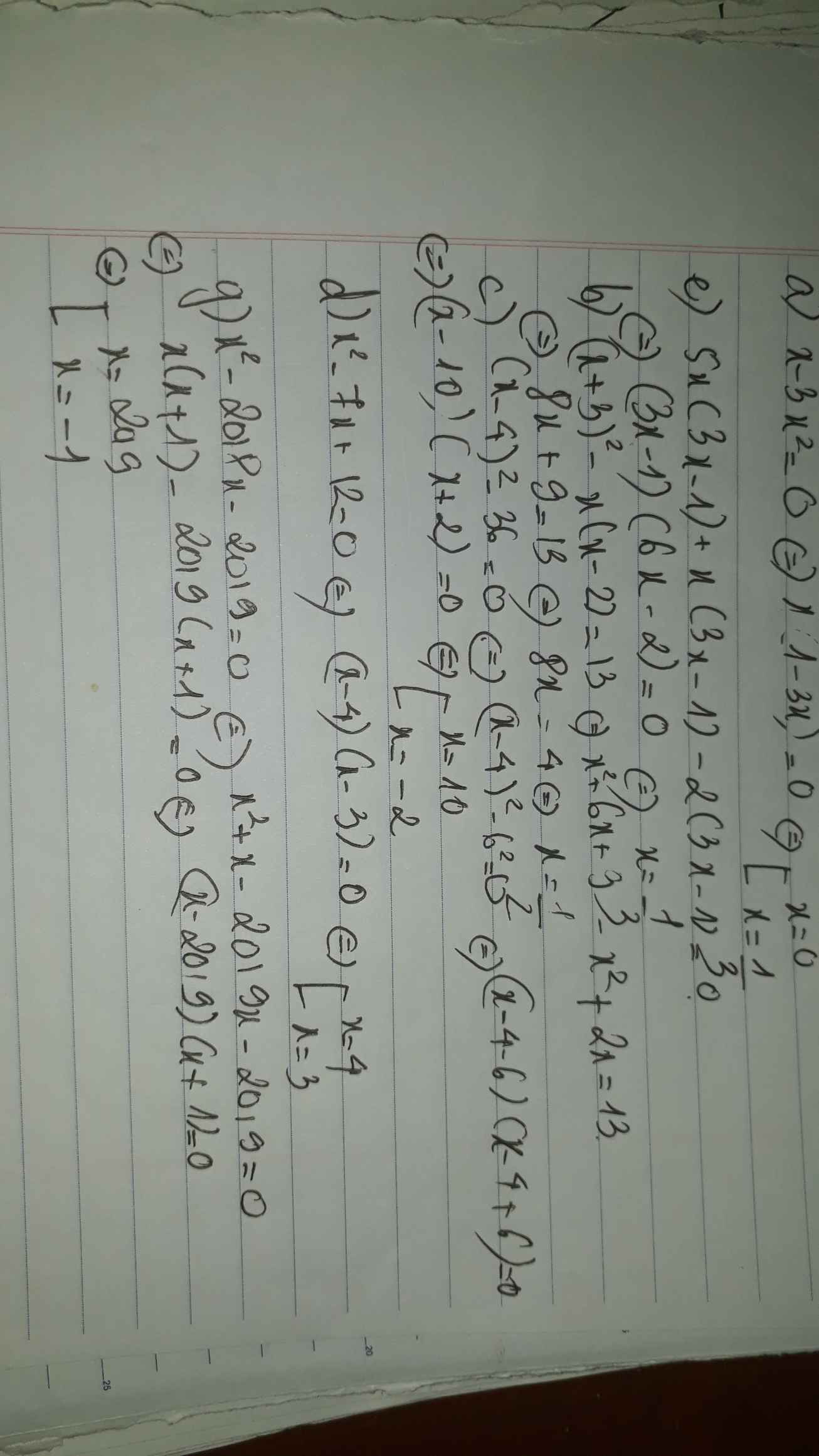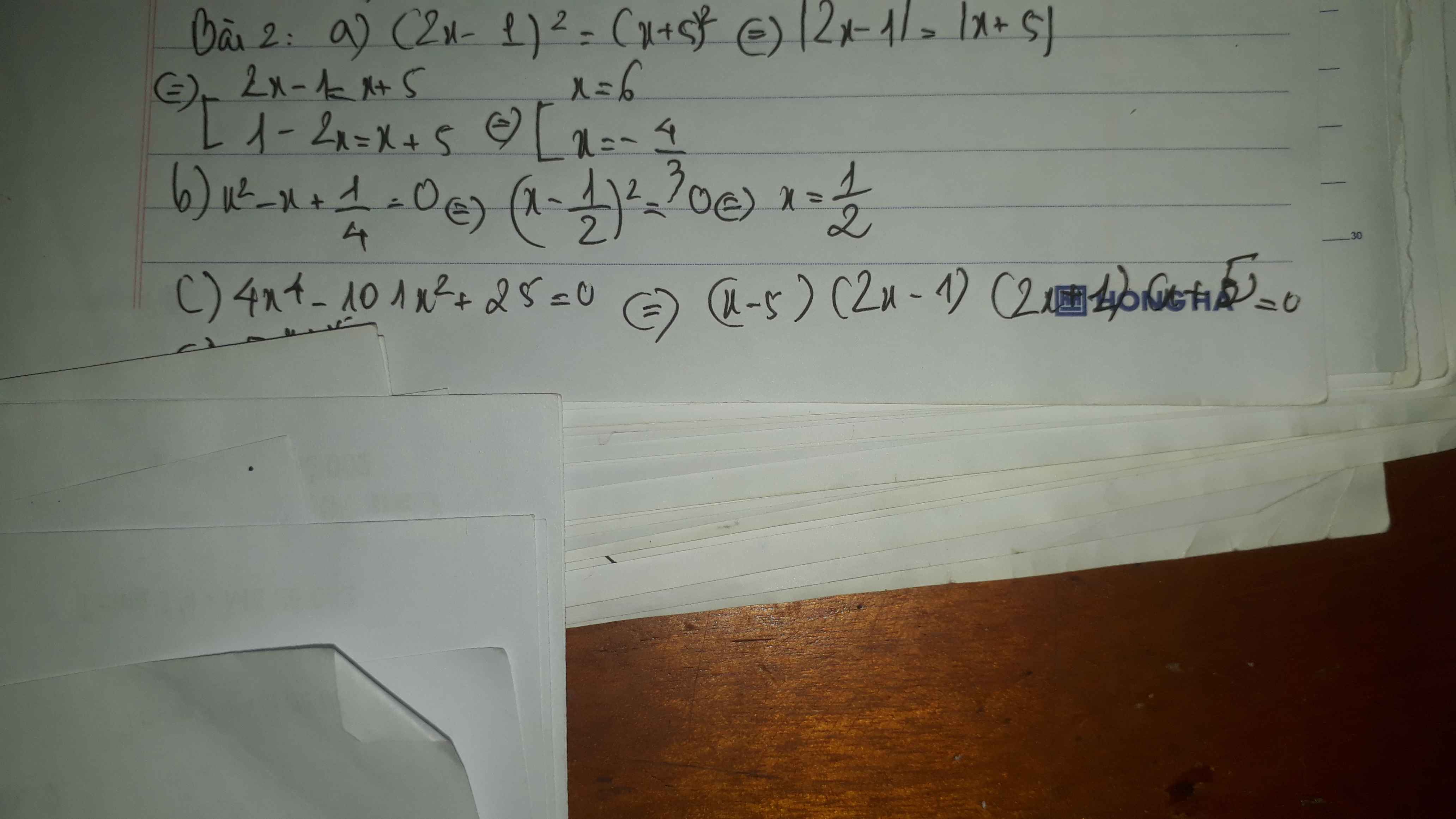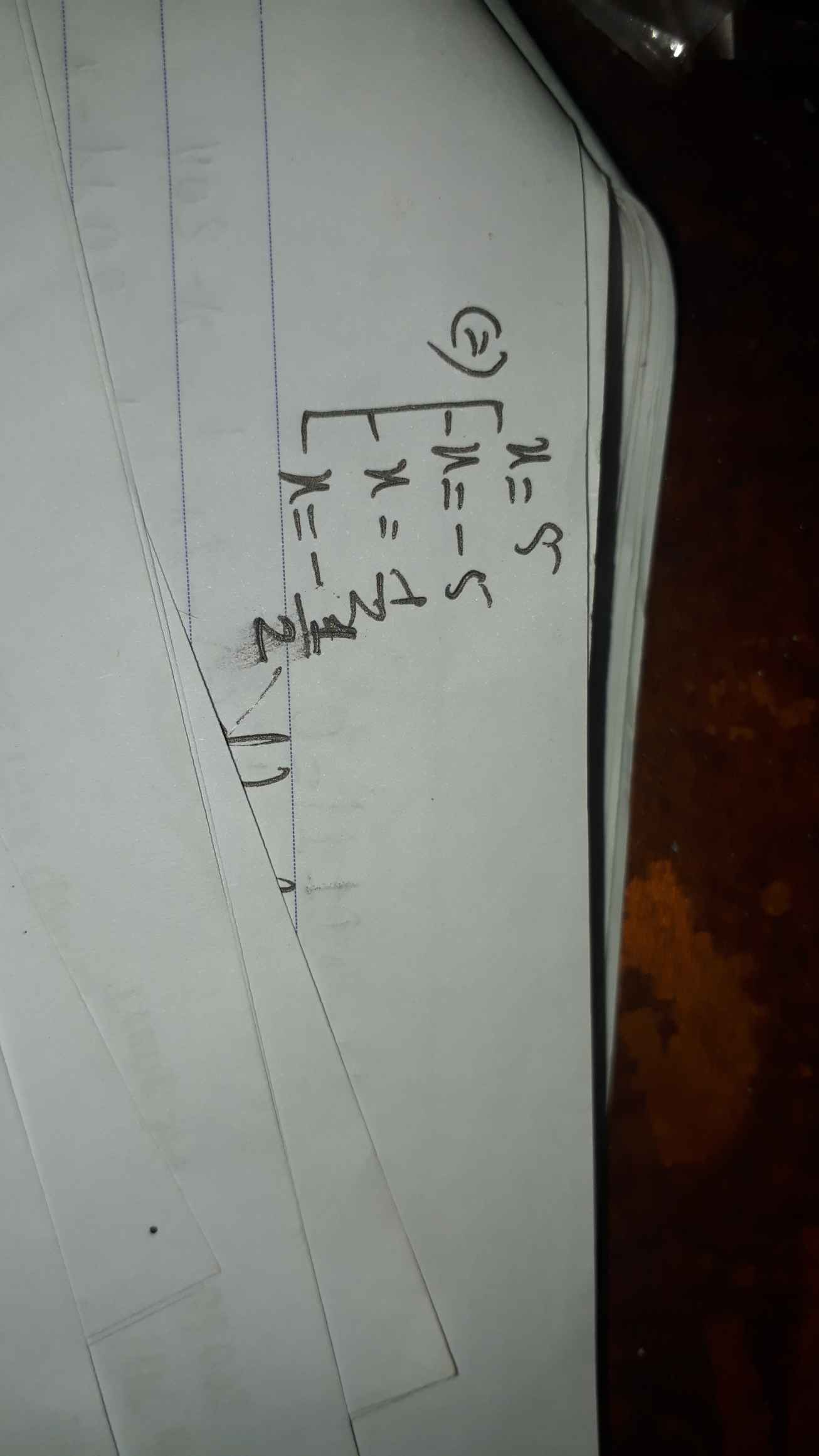Tìm GTLN:
a) A = 100 - 2x - x2
b) B = -3x2 + x
c) C = 3x(1 - x)
Hãy nhập câu hỏi của bạn vào đây, nếu là tài khoản VIP, bạn sẽ được ưu tiên trả lời.


`P(x)=\(4x^2+x^3-2x+3-x-x^3+3x-2x^2\)
`= (x^3-x^3)+(4x^2-2x^2)+(-2x-x+3x)+3`
`= 2x^2+3`
`Q(x)=`\(3x^2-3x+2-x^3+2x-x^2\)
`= -x^3+(3x^2-x^2)+(-3x+2x)+2`
`= -x^3+2x^2-x+2`
`P(x)-Q(x)-R(x)=0`
`-> P(X)-Q(x)=R(x)`
`-> R(x)=P(x)-Q(x)`
`-> R(x)=(2x^2+3)-(-x^3+2x^2-x+2)`
`-> R(x)=2x^2+3+x^3-2x^2+x-2`
`= x^3+(2x^2-2x^2)+x+(3-2)`
`= x^3+x+1`
`@`\(\text{dn inactive.}\)
a: P(x)-Q(x)-R(x)=0
=>R(x)=P(x)-Q(x)
=2x^2+3+x^3-2x^2+x-2
=x^3+x+1

Bài 1:
\(a,=6x^2+6x\\ b,=15x^3-10x^2+5x\\ c,=6x^3+12x^2\\ d,=15x^4+20x^3-5x^2\\ e,=2x^2+3x-2x-3=2x^2+x-3\\ f,=3x^2-5x+6x-10=3x^2+x-10\)
Bài 2:
\(a,\Leftrightarrow3x^2+3x-3x^2=6\\ \Leftrightarrow3x=6\Leftrightarrow x=2\\ b,\Leftrightarrow6x^2+3x-6x^2+9x-2x-3=10\\ \Leftrightarrow10x=13\Leftrightarrow x=\dfrac{13}{10}\)

a) \(N=-1-x-x^2=-\left(x^2+x+\dfrac{1}{4}\right)-\dfrac{3}{4}=-\left(x+\dfrac{1}{2}\right)^2-\dfrac{3}{4}\le-\dfrac{3}{4}\)
\(maxN=-\dfrac{3}{4}\Leftrightarrow x=-\dfrac{1}{2}\)
b) \(B=3x^2+4x-13=3\left(x^2+\dfrac{4}{3}x+\dfrac{4}{9}\right)-\dfrac{35}{3}=3\left(x+\dfrac{2}{3}\right)^2-\dfrac{35}{3}\ge-\dfrac{35}{3}\)
\(minB=-\dfrac{35}{3}\Leftrightarrow x=-\dfrac{2}{3}\)
a: Ta có: \(N=-x^2-x-1\)
\(=-\left(x^2+x+1\right)\)
\(=-\left(x^2+2\cdot x\cdot\dfrac{1}{2}+\dfrac{1}{4}+\dfrac{3}{4}\right)\)
\(=-\left(x+\dfrac{1}{2}\right)^2-\dfrac{3}{4}\le-\dfrac{3}{4}\forall x\)
Dấu '=' xảy ra khi \(x=-\dfrac{1}{2}\)
b: ta có: \(B=3x^2+4x-13\)
\(=3\left(x^2+\dfrac{4}{3}x-\dfrac{13}{3}\right)\)
\(=3\left(x^2+2\cdot x\cdot\dfrac{2}{3}+\dfrac{4}{9}-\dfrac{43}{9}\right)\)
\(=3\left(x+\dfrac{2}{3}\right)^2-\dfrac{43}{3}\ge-\dfrac{43}{3}\forall x\)
Dấu '=' xảy ra khi \(x=-\dfrac{2}{3}\)

\(1,\\ a,=3x^3-2x^2+5x\\ b,=2x^3y^2+\dfrac{2}{9}x^4y^2-\dfrac{1}{3}x^2y^3\\ c,=x^2-2x+6x-12=x^2+4x-12\\ 2,\\ a,\Rightarrow6x-9+4-2x=-3\\ \Rightarrow4x=2\Rightarrow x=\dfrac{1}{2}\\ b,\Rightarrow5x-2x^2+2x^2-2x=13\\ \Rightarrow3x=13\Rightarrow x=\dfrac{13}{3}\\ c,\Rightarrow5x^2-5x-5x^2+7x-10x+14=6\\ \Rightarrow-8x=-8\Rightarrow x=1\\ d,\Rightarrow6x^2+9x-6x^2+4x-15x+10=8\\ \Rightarrow-2x=-2\Rightarrow x=1\)
\(3,\\ A=2x^2+x-x^3-2x^2+x^3-x+3=3\\ B=6x^2-10x+33x-55-6x^2-14x-9x-21=-76\)

d: =>6x^2+2x-3x-1+9x-6x^2+12-8x=5
=>13=5(loại)
e: =>0,6x^2-0,3x-0,6x^2-0,39x=0,38
=>-0,69x=0,38
=>x=-38/69

\(A=\dfrac{4\left(x^2-4x+4\right)+\left(x^2-8x+16\right)}{x^2-4x+4}=4+\left(\dfrac{x-4}{x-2}\right)^2\ge4\)
\(A_{min}=4\) khi \(x=4\) (A max ko tồn tại)
\(B=\dfrac{6\left(x^2+2x+1\right)+\left(4x^2+12x+9\right)}{x^2+2x+1}=6+\left(\dfrac{2x+3}{x+1}\right)^2\ge6\)
\(B_{min}=6\) khi \(x=-\dfrac{3}{2}\)
B max ko tồn tại

a: =>3x+10-2x=0
hay x=-10
c: \(\Leftrightarrow3x^2-3x^2+6x=36\)
=>6x=36
hay x=6

Bài 1:
a: \(=6x^3-10x^2+6x\)
b: \(=-2x^3-10x^2-6x\)
Bài 4:
a: =>3x+10-2x=0
=>x=-10
c: =>3x2-3x2+6x=36
=>6x=36
hay x=6
Bài 1:
\(a,=6x^3-10x^2+6x\\ b,=-2x^3-10x^2-6x\)
Bài 4:
\(a,\Leftrightarrow3x+10-2x=0\Leftrightarrow x=-10\\ b,\Leftrightarrow x\left(2x^2+9x-5\right)-\left(2x^3+9x^2+x+4,5\right)=3,5\\ \Leftrightarrow2x^3+9x^2-5x-2x^3-9x^2-x-4,5=3,5\\ \Leftrightarrow-6x=8\Leftrightarrow x=-\dfrac{4}{3}\\ c,\Leftrightarrow3x^2-3x^2+6x=36\Leftrightarrow x=6\)
Bài 1:
\(a,=7xy\left(2x-3y+4xy\right)\\ b,=x\left(x+y\right)-5\left(x+y\right)=\left(x-5\right)\left(x+y\right)\\ c,=\left(x-y\right)\left(10x+8\right)=2\left(5x+4\right)\left(x-y\right)\\ d,=\left(3x+1-x-1\right)\left(3x+1+x+1\right)\\ =2x\left(4x+2\right)=4x\left(2x+1\right)\\ e,=5\left[\left(x-y\right)^2-4z^2\right]=5\left(x-y-2z\right)\left(x-y+2z\right)\\ f,=x^2+8x-x-8=\left(x+8\right)\left(x-1\right)\\ g,\left(x+y\right)^3-\left(x+y\right)=\left(x+y\right)\left[\left(x+y\right)^2-1\right]\\ =\left(x+y\right)\left(x+y-1\right)\left(x+y+1\right)\\ h,=x^2+3x+x+3=\left(x+3\right)\left(x+1\right)\)
 Bài 1.
Bài 1.

a. \(A=100-2x-x^2=-\left(x+1\right)^2+101\)
Vì \(\left(x+1\right)^2\ge0\forall x\)\(\Rightarrow-\left(x+1\right)^2+101\le101\)
Dấu "=" xảy ra \(\Leftrightarrow-\left(x+1\right)^2=0\Leftrightarrow x=-1\)
Vậy maxA = 101 <=> x = - 1
b. \(B=-3x^2+x=-3\left(x-\frac{1}{6}\right)^2+\frac{1}{12}\)
Vì \(\left(x-\frac{1}{6}\right)^2\ge0\forall x\) \(\Rightarrow-3\left(x-\frac{1}{6}\right)^2+\frac{1}{12}\le\frac{1}{12}\)
Dấu "=" xảy ra \(\Leftrightarrow-3\left(x-\frac{1}{6}\right)^2=0\Leftrightarrow x=\frac{1}{6}\)
Vậy maxB = 1/12 <=> x = 1/6
c. \(C=3x\left(1-x\right)=3x-3x^2=-3\left(x-\frac{1}{2}\right)^2+\frac{3}{4}\)
Vì \(\left(x-\frac{1}{2}\right)^2\ge0\forall x\)\(\Rightarrow-3\left(x-\frac{1}{2}\right)^2+\frac{3}{4}\le\frac{3}{4}\)
Dấu "=" xảy ra \(\Leftrightarrow-3\left(x-\frac{1}{2}\right)^2=0\Leftrightarrow x=\frac{1}{2}\)
Vậy maxC = 3/4 <=> x = 1/2
A = 100 - 2x - x2
= -( x2 + 2x + 1 ) + 101
= -( x + 1 )2 + 101 ≤ 101 ∀ x
Đẳng thức xảy ra <=> x + 1 = 0 => x = -1
=> MaxA = 101 <=> x = -1
B = -3x2 + x
= -3( x2 - 1/3x + 1/36 ) + 1/12
= -3( x - 1/6 ) + 1/12 ≤ 1/12 ∀ x
Đẳng thức xảy ra <=> x - 1/6 = 0 => x = 1/6
=> MaxB = 1/12 <=> x = 1/6
C = 3x( 1 - x )
= -3x2 + 3x
= -3( x2 - x + 1/4 ) + 3/4
= -3( x - 1/2 )2 + 3/4 ≤ 3/4 ∀ x
Đẳng thức xảy ra <=> x - 1/2 = 0 => x = 1/2
=> MaxC = 3/4 <=> x = 1/2